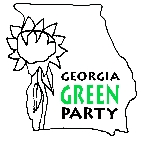 |
Your
Constitutional
Right to Petition! |
| Home • Tools for the Active Citizen • |
The First Amendment of the U.S. Constitution provides:
. . . to petition the government for redress of grievances."
The Georgia Constitution,
Article I. The Bill of Rights, Section I. Rights of Persons,
Paragraph IX. Right to assemble and petition, provides:
to those vested with the powers of government for redress of grievances."
These rights apply to what are known in Constitutional Law as "traditional public forums", including parks and sidewalks. While First Amendment activity may be subject to "reasonable time, manner and place regulations if 'the restrictions are content-neutral, are narrowly tailored to serve a significant government interest, and leave open ample alternative channels of communication'," they may not be outright denied. Stone Mountain Memorial Association v Zauber 262 Ga. 661, at 662 (1993), which followed the reasoning of United States v Grace, 461 U.S. 171 at 177 (1983).
And the U.S. Supreme Court held in Prunyard Shopping Center v Robins, 447 US 74 (1980), (synopsis.pdf) that a state recognition of a right to petition on private property to which the public had been invited violates no federal property right. The Pruneyard decision is useful for propaganda and for bluffing our way past hostile merchants. But please don't rely on it to the extent that you face arrest.
The Georgia Supreme Court held in Citizens for Ethical Government,
Inc. v Gwinnett Place Associates, L.P. 260 Ga. 245 (1990) "that nothing
in the Georgia Constitution or the Recall Act of 1989, either separately
or together, establishes a right of private citizens to enter onto such
property to solicit signatures for a recall petition. In so holding
we . . . decline to follow the reasoning of the California
Supreme Court found in Robins v Pruneyard Shopping Center .
. . " (at p.246). The facts of this case involved
recall petition activity at a mall where the owners had "uniformly applied"
a blanket prohibition on "all solicitation and political activity in the
mall".
.
Please note that I am not an attorney. I have researched these
issues with the assistance of attorneys, including attorneys experienced
in First Amendment Law. Our goal is not to test the bounds of Constitutional
Law as it relates to the right to petition. Our goal is to file complete
and valid petitions to place our Presidential and local candidates on the
ballot for the 2000 election.
If you do encounter police harrassment that you feel violates your rights, please let us know. We are in communication with First Amendment attorneys who have agreed to assist us in Court, when we have a case with a good set of facts on which we can prevail.
-- Hugh Esco
Canvas Director,
Georgia Green Party
|
Ecological Wisdom • Grassroots Democracy • Social Justice • Peace and Non-Violence • Decentralization • Community-Based Economics • Feminism • Respect for Diversity • Personal & Global Responsibility • Future Focus on Sustainability Georgia Green Party P.O. Box 5332; Atlanta, GA 31107 (877) GREEN-09 (vm & fax) * ggp@greens.org |